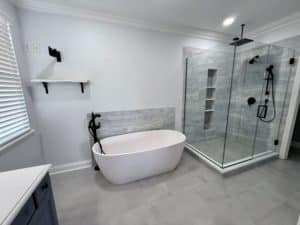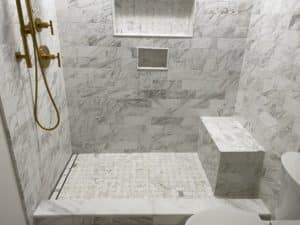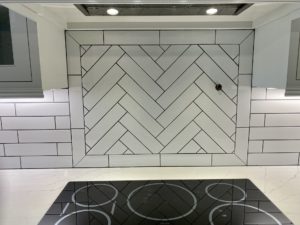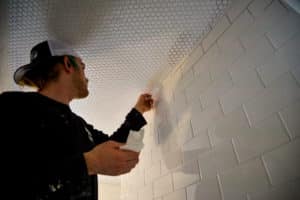The Tile Decision Every Indiana Homeowner Faces
When considering tile installation for your Indiana home, weighing the pros and cons of DIY versus professional tile installation services is essential. As a contractor who’s worked with countless Indiana homeowners, I’ve seen the growing popularity of tile in kitchens, bathrooms, and living spaces across the state.
The DIY movement has certainly gained momentum, with home improvement stores offering weekend workshops and YouTube tutorials promising to make anyone a tiling expert overnight. But is this really the best approach for your home?
In this article, I’ll break down everything you need to know about making this important decision. Drawing from my years of experience with tile installation in Indiana homes, I’ll help you understand when to tackle a project yourself and when to call in the professionals.
Why Tile Installation Quality Matters for Indiana Homes

Professional tile installation ensures your floors and surfaces can withstand Indiana’s unique climate challenges. Our state experiences significant temperature fluctuations throughout the year, from humid 90-degree summers to below-freezing winters.
These temperature swings cause building materials to expand and contract. Proper tile installation accounts for this movement with appropriate expansion joints and installation techniques that prevent cracking and lifting.
Improper installation often leads to moisture infiltration beneath tiles. In Indiana’s humid conditions, this can quickly lead to mold growth and subfloor damage that costs thousands to repair.
Signs of Quality Tile Installation
- Even grout lines with consistent width throughout
- No lippage (height differences) between adjacent tiles
- Solid sound when tapped (no hollow spots indicating poor adhesion)
- Proper slope in wet areas for drainage
- Expansion joints where tile meets walls or different surfaces
The quality of your tile installation directly impacts your home’s value. Indiana’s real estate market increasingly values well-executed tile work, especially in kitchens and bathrooms where buyers focus their attention.
The Real Costs of DIY Tile Installation: Beyond the Price Tag
While DIY ceramic tile installation may seem cost-effective initially, several hidden expenses can affect your bottom line. The material costs are just the beginning of your investment.
Specialized tools like wet saws, notched trowels, and leveling systems can quickly add hundreds to your budget. Many of these tools will only be used once, making their purchase questionable for a single project.
The waste factor is another consideration often overlooked. Professional installers typically calculate a 10-15% waste factor, but DIYers frequently underestimate or make cutting errors that can push this percentage much higher.
Hidden DIY Tile Installation Expenses:
- Specialized tools and equipment rental/purchase
- Additional materials for mistakes and learning curve
- Substrate preparation materials (underlayment, waterproofing)
- Delivery fees for heavy materials
- Time off work to complete the project
- Potential repairs if issues develop
The physical demands shouldn’t be underestimated either. Tile work involves hours of kneeling, bending, and lifting heavy materials. Many DIYers I’ve spoken with express surprise at how physically demanding the process is.
What Professional Tile Installers Bring to Your Project

Hiring a qualified tile installer provides expertise that ensures your project is completed correctly the first time. We bring specialized knowledge about substrate preparation specific to Indiana homes.
Many older Indiana homes have unique subfloor situations that require experienced assessment. What looks like a simple tile job can quickly become complicated when we discover previous layers of flooring or structural issues that need addressing.
Professional installers have access to commercial-grade setting materials not typically available to consumers. These products often offer better performance and longevity than retail versions.
Qualifications to Look for in a Professional Tile Installer:
- Certification from organizations like the Ceramic Tile Education Foundation
- Portfolio of completed projects similar to yours
- Knowledge of current industry standards (TCNA guidelines)
- Proper licensing and insurance
- Familiarity with Indiana building codes
- Positive reviews from local customers
- Clear, detailed contracts and warranties
The efficiency and precision professionals bring to cutting and pattern layouts create a significant difference in the final appearance. Complicated cuts around doorjambs, toilet flanges, and other obstacles require experience to execute cleanly.
Perhaps most importantly, professional installation typically comes with warranty protection. If something goes wrong months after installation, you have recourse that DIY projects simply don’t provide.
How to Assess Your DIY Capabilities for Tile Projects
Before attempting DIY tile floor installation, honestly evaluate your technical abilities and available time. Not all tile projects are created equal, and some are more DIY-friendly than others.
Do you have experience with precision measuring and cutting? Are you comfortable using levels and working with mathematical calculations? These skills form the foundation of successful tile work.
The complexity of your specific project plays a major role in determining DIY suitability. A simple backsplash using standard subway tiles might be manageable, while a shower installation with complex waterproofing requirements deserves professional attention.
DIY Tile Project Self-Assessment:
Beginner-Friendly Projects:
- Small backsplash with standard rectangular tiles
- Laundry room floor with large format tiles
- Entryway with straightforward layout
Intermediate Projects:
- Bathroom floor with simple pattern
- Kitchen floor with standard layout
- Fireplace surround
Professional Recommended:
- Full shower installations
- Complex patterns (herringbone, basketweave)
- Large open spaces requiring perfect leveling
- Natural stone installation
The tools needed for proper installation extend beyond what most homeowners already own. A quality tile saw alone can cost several hundred dollars, making it a significant investment for a single project.
Which Rooms Benefit Most from Professional Tile Installation?
Professional bathroom tile installation ensures proper waterproofing that prevents costly water damage. Bathrooms present unique challenges with multiple water sources, drainage requirements, and complex cuts around fixtures.
The waterproofing systems used in modern bathrooms have evolved significantly. Professional installers stay current with these technologies and installation requirements that protect your home’s structure.
Kitchen tile installation requires precision around cabinetry, islands, and appliances. The detailed cutting and fitting in these spaces often frustrates DIYers who find themselves making multiple trips to rent a tile saw for additional cuts.
High-traffic areas like entryways and main living spaces benefit from professional installation that ensures durability. These areas see the most wear and require proper substrate preparation to prevent tiles from cracking under constant use.
Projects involving specialty tiles like natural stone, glass, or large-format porcelain demand professional expertise. These materials have specific installation requirements and often require specialized cutting equipment to prevent expensive breakage.
Common DIY Tile Installation Mistakes That Lead to Costly Repairs

Many homeowners require professional tile repair services due to these common DIY mistakes. Inadequate subfloor preparation tops the list of problems I encounter when called to fix failed installations.
An uneven subfloor leads to lippage (where tile edges aren’t flush), cracking, and loose tiles. Taking shortcuts during preparation almost always results in problems becoming visible within months of installation.
Improper thinset mixing and application causes adhesion failures. The consistency needs to be just right – too wet and it won’t support the tile; too dry and it won’t adhere properly.
Inconsistent tile spacing creates a visually distracting installation that draws attention to the workmanship rather than the beautiful tile itself. Professional installers use spacers and leveling systems to ensure perfect alignment.
In Indiana’s climate, failing to accommodate for expansion and contraction is particularly problematic. Tiles installed tight against walls or other boundaries will buckle or crack when normal seasonal movement occurs.
Poor waterproofing in wet areas leads to some of the most expensive repairs. Water infiltration behind shower or tub tile can cause structural damage that extends far beyond the tile itself, sometimes affecting multiple rooms.
How to Find and Vet a Qualified Tile Installer in Indiana
When researching tile installation services in Indiana, look beyond price to evaluate experience and specialization. Start by seeking recommendations from friends, family, and neighbors who have recently had tile work completed.
Check for membership in professional organizations like the National Tile Contractors Association (NTCA) or Ceramic Tile Education Foundation (CTEF). These affiliations indicate a commitment to industry standards and continuing education.
Always verify proper licensing and insurance. In Indiana, contractors should have general liability insurance at minimum, and workers’ compensation coverage if they have employees.
Questions to Ask Potential Tile Installers:
- How many years have you specialized in tile installation?
- Can you provide references for similar projects?
- Do you have photos of recent installations?
- What type of warranty do you provide?
- Will you handle all aspects of the job or use subcontractors?
- What preparation work is included in your quote?
- How do you handle unexpected issues that arise during installation?
Request detailed, written estimates that specify all aspects of the work. Vague proposals often lead to misunderstandings and unexpected costs during the project.
Visit showrooms or completed projects if possible. Seeing the installer’s work firsthand gives you the best sense of their quality standards and attention to detail.
The Artistic Tile & Design Difference: Our Approach to Tile Installation

At Artistic Tile & Design, LLC, we’ve refined our tile installation services to address the specific needs of Indiana homeowners. Our deep understanding of local housing construction and environmental factors sets our work apart.
We begin every project with a comprehensive consultation that helps us understand not just your aesthetic goals, but how you use the space. This informs our recommendations for tile selections and installation methods that will perform best for your specific situation.
Our installation teams undergo continuous training to stay current with evolving industry best practices and new materials. This expertise translates to installations that not only look beautiful but stand the test of time.
We use only premium setting materials that often exceed industry standards. While these materials may cost slightly more initially, they prevent common problems like grout cracking and tile loosening that plague many installations within just a few years.
Our project management system keeps you informed throughout the installation process. You’ll never wonder about timelines or next steps – we provide clear communication from start to finish.
Making the Right Choice for Your Indiana Tile Project
Whether you choose DIY or professional tile installation, understanding the requirements of your specific project is crucial for lasting results. The decision ultimately comes down to your skill level, available time, and the complexity of your project.
For simple, small-scale projects like basic backsplashes, the DIY approach might make sense if you’re confident in your abilities. For more complex installations like showers, large floor areas, or specialty tiles, professional installation offers significant advantages.
Remember that tile installation is both a technical skill and an art form. The best installations combine proper structural techniques with an eye for pattern, proportion, and detail that comes from experience.
I’ve seen how quality tile installation transforms Indiana homes, adding both beauty and value that lasts for decades. Whatever path you choose, take the time to understand what your specific project requires for success.
If you’re still unsure about the best approach for your tile project, I’m happy to help. Contact Artistic Tile & Design today for a free consultation to discuss your tile installation project and receive expert advice tailored to your Indiana home.
